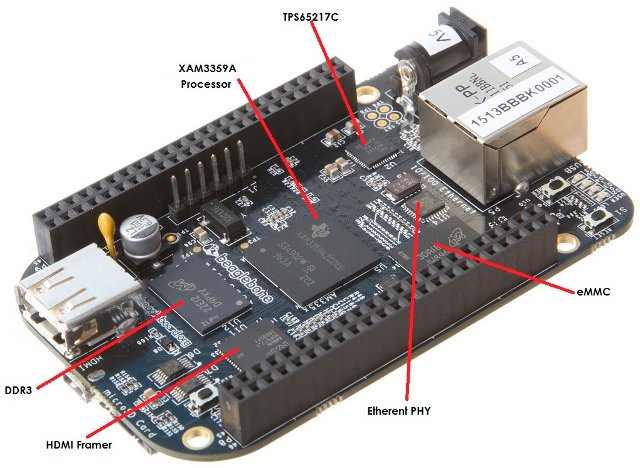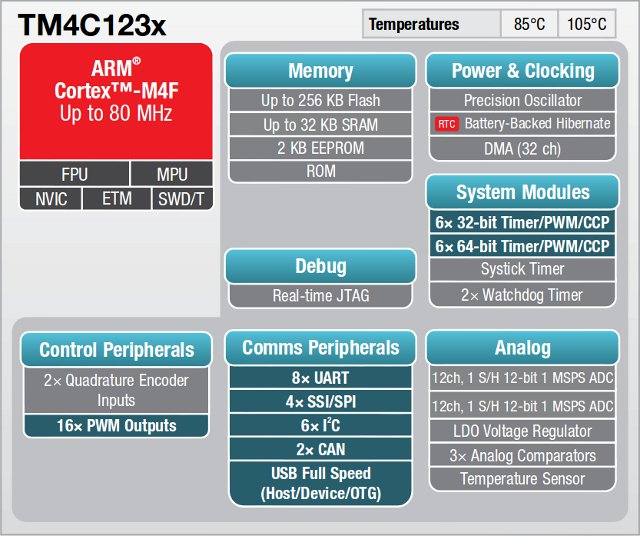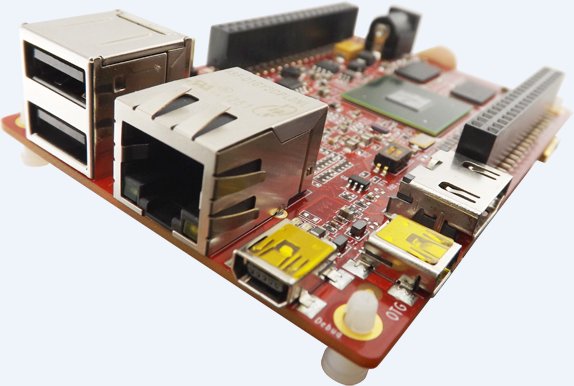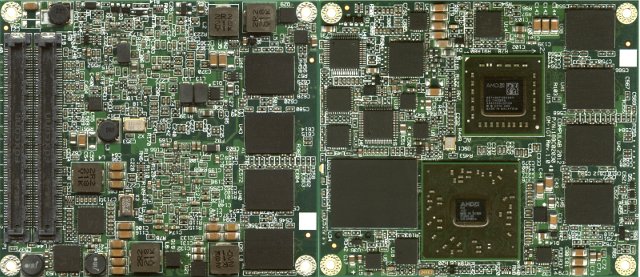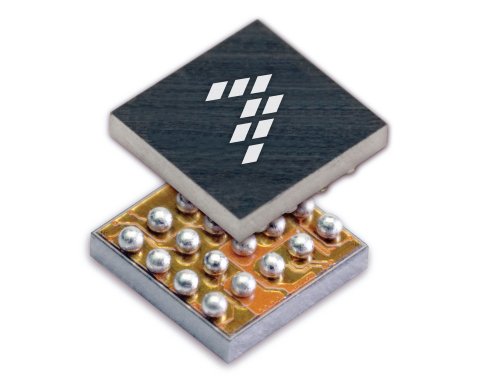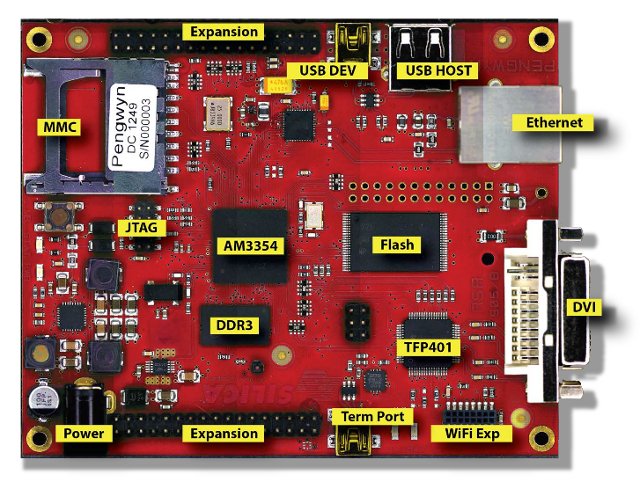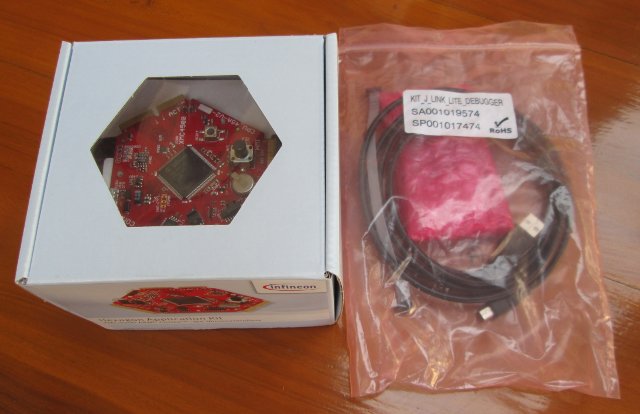We’ve already known that a new, faster and cheaper BeagleBone is on the way for a little while, but very few details were provided at the time. There are now better pictures, the specifications are available, and it looks like the new BeagleBone will be called BeagleBone Black. BeagleBone Black Specifications: SoC – Texas Instruments Sitara AM3359AZCZ100 Cortex A8 @ 1 GHz + PowerVR SGX530 GPU System Memory – 512 MB DDR3L @ 400 MHz Storage – 2GB eMMC + micro SD slot USB – USB0 (client mode) via mini USB, USB1 (host) type A socket Serial Port – UART0 via 3.3V TTL header Ethernet – 10/100, RJ45 Video Output – micro HDMI with EDID support, up to 1280×1024 resolution. Audio Output – Via HDMI Expansion Connectors – Power, McASP0, SPI1, I2C, 65x GPIOs, LCD, GPMC, MMC1/2, 7x AIN (1.8V MAX), 4x timers, 3x serial ports, CAN0, EHRPWM0/2, XDMA interrupt, […]
Texas Instruments Announces Tiva Cortex M4 MCUs and $12.99 LaunchPad Evaluation Kit
Texas Instruments has just announced the Tiva ARM MCU platform, and specifically the Tiva C Series TM4C123x ARM Cortex-M4 MCUs, which are the first Cortex-M MCUs to be built on 65 nanometer flash process technology. The Tiva C Series TM4C123x MCUs, formerly known as Stellaris LM4F MCUs, are available now and target home, building and industrial automation. Key features and benefits of Tiva C Series MCUs: MCU Core – ARM Cortex-M4 floating-point core, operating at up to 80 MHz. Mixed-signal applications with high-performance analog integration – 2×12-bit ADC and 3 comparators.12-bit ADC accuracy is achievable at the full 1 MSPS rating without any hardware averaging. On-chip connectivity options – USB (host, device and On-The-Go), UARTs, I2C, SSI/SPI, CAN, etc.. Non-volatile storage of user interface or configuration parameters to reduce system cost – Thanks to integrated EEPROM. Low power – Standby currents as low as 1.6 uA. Large choice of MCU […]
$99 MarS Board Features Freescale i.MX6 Dual, 4GB eMMC
Embest, a subsidiary of Element14, has just announced the MarS Board, a development board powered by Freescale i.MX6 Dual (2x Cortex A9) with 1 GB RAM and 4GB eMMC flash. This is not related to the Marsboard based on AllWinner A10, and designed & manufactured by another company. Here are the key features of the MarS Board: SoC – Freescale i.MX6 Dual 2xCortex-A9 Processor @ 1GHz + Vivante GC2000 GPU. System Memory – 1GB RAM (4*256MB DDR3 SDRAM) Storage – 4GB eMMC + micro SD card slot (up to 32GByte) Video Output – 1xHDMI interface, 1x LVDS interface and 1x LCD interface USB – 4x USB Host ports (2x USB connector, 2x via headers), 1x mini USB OTG port, and 1x mini USB for debug Connectivity – 10/100M/1Gbps RJ45 Ethernet interface 2 Expansion Hearders – 2x CAN, 2x IIC, Audio & SPDIF, 8bit IPU1(Camera), SPI, USDHC1(SD card), 4x UART, 2x […]
$89 Compulab CM-iGT CoMs Feature AMD G-Series APUs
Compulab, an Israeli company specialized in embedded computing, has recently introduced computers-on-module based on AMD G-Series APUs that will sell for as low as $89 per unit (for 1k orders) depending on selected features and options. The module is available in commercial, extended and industrial grades, and supports up to 4GB RAM, and 32 GB Flash. Here are the specifications of these modules: CPU – AMD G-Series Processor: G-T16R single-core @ 600MHz, G-T40E dual-core @ 1GHz or G-T56N dual-core @ 1.65GHz GPU – Integrated GPU Radeon HD 6250 supporting the following standards: DirectX 11, OpenGL 4.0, OpenCL Video Processing Unit – UVD 3 engine with native H.264, VC-1, MPEG2, and DivX, 1080p Blu-Ray playback support System Memory – 2GB – 4GB DDR3-1066, 64-bit Storage: On-board BIOS flash, 1MB, reprogrammable On-board SSD, up to 32GB, MLC, through SATA interface Interfaces: Display – Up to two DisplayPort interfaces, up to two HDMI […]
Freescale Unveils Kinetis KL02, an Ultra Small (1.9×2.0mm) ARM Cortex M0+ Microcontroller
Freescale Semiconductor introduced the Kinetis KL02, the world’s smallest ARM MCU, at Embedded World 2013. KL02 is an ARM Cortex M0+ micro-controller designed to address the miniaturization needs of the Internet of things, and its size (1.9×2.0mm) makes it suitable for applications such as ingestible healthcare sensing, portable consumer devices, remote sensing nodes, and wearable devices. Kinetis KL02 MCU features include: 48 MHz ARM Cortex-M0+ core, 1.71-3.6V operation Bit manipulation engine for faster, more code-efficient handling of peripheral registers 32 KB flash memory, 4 KB RAM High-speed 12-bit analog-to-digital converter High-speed analog comparator Low-power UART, SPI, 2x IICI2C Powerful timers for a broad range of applications including motor control Power Efficiency – 15.9 CM/mA (Coremark 1.0) -40 °C to +85 °C operation The MCU is manufactured using chip-scale package (CSP) technology that allows to connect the die directly to the solder ball interconnects and, in turn, to the printed […]
mbed 2.0 SDK Released, becomes Open Source and Supports $12.95 Freescale Freedom Board
The mbed community has had a pretty busy week, with first the announcement that mbed SDK would become open source, the release of mbed 2.0, and finally support for the low cost Freescale Freedom board FRDM-KL25Zpowered by Kinetis Cortex M0+ KL25Z MCU. mbed becomes open source The mbed Software Development Kit (SDK), a C/C++ MCU software platform, has always been free (as in free beer) for both commercial and noncommercial use, and the large community around mbed has written tons of code for ARM microcontrollers. But now that the SDK has now a stable API, and the developers achieved transparent portability for code based on the SDK across multiple controllers and multiple toolchains, they decided to release the SDK source under an Apache 2.0 license. Although sharing modifications is encouraged, this license allows users to keep the changes closed if they wish to do so. mbed developers explain that the 3 […]
SILICA Pengwyn Low Cost Open Industrial Development Platform Powered by Sitara AM3354 Processor
At the end of January, SILICA, an Avnet subsidiary, announced the Pengwyn, a single board computer based on Texas Instruments Sitara AM3354 Cortex A8 processor. The board targets industrial customers, and the company promotes it as “an open platform to develop applications under Linux or Windows Embedded operating systems”. Here are the specifications of the Pengwyn board: Texas Instruments Sitara AM 3354 ARM Cortex-A8 MCU @ 720 MHz System Memory – 256 MB DDR3 Storage – 1 GB Nand Flash, 32 MB SPI Flash Memory, and microSD slot (if not used with Wi-Fi/Bt modules) Connectivity and expandability USB Host and Device Ports RJ-45 Ethernet Port Connector for optional 1 GB Ethernet Port 2x connectors for generic expansions modules SDIO/MMC Port (can be used for optional WI-FI/bluetooth modules) DVI Display Port Silica will provide Linux (Arago Project, an OpenEmbedded based Distribution) and Windows Embedded Compact 7 BSP and images, as well as […]
Infineon Hexagon Application Kit (XMC4500 Enterprise Edition) Overview and Quick Start Guide
A few months ago, Infineon sent me XMC4500 Relax Lite Kit for review, and I wrote a short Getting Started Guide about this 10 Euros Cortex M4 devkit. This month, I’ve received another XMC4500 kit with more features and expansion abilities: XMC4500 Enterprise Edition which is one of their Hexagon Application Kit. I received two packages: CPU Board XMC4500 General Purpose (CPU_45A-V2) with accessories (55 Euros) – This is what you get when you order to Basic Kit. J-Link Lite Cortex-M Debugger (40 Euros) Let’s open the packages and see what’s inside. In the first package, we’ve got XMC4500 CPU board, a pin extension board that can be used on any of the 3 extension connectors of the CPU board to access the signals easily, and a microUSB to USB cable for power. The JLink debugger comes with a 10-pin ribbon cable, and a microUSB to USB cable to connect to the […]


